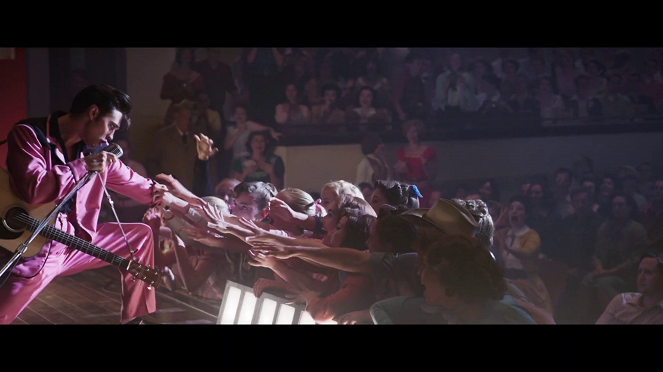Directed by:
Baz LuhrmannCinematography:
Mandy WalkerComposer:
Elliott WheelerCast:
Austin Butler, Tom Hanks, Olivia DeJonge, Richard Roxburgh, Helen Thomson, Dacre Montgomery, Luke Bracey, Kelvin Harrison Jr., Kodi Smit-McPhee, David Wenham (more)VOD (3)
Plots(1)
Baz Luhrmann’s Elvis explores the life and music of Elvis Presley, seen through the prism of his complicated relationship with his enigmatic manager, Colonel Tom Parker. The story delves into the complex dynamic between Presley and Parker spanning over 20 years, from Presley’s rise to fame to his unprecedented stardom, against the backdrop of the evolving cultural landscape and loss of innocence in America. Central to that journey is one of the most significant and influential people in Elvis’s life, Priscilla Presley. (Warner Bros. US)
(more)Videos (2)
Reviews (13)
Two and a half hours of visual debauchery where the editor, the cinematographer and the director's specific signature reign supreme. However, when it comes to the emotional level, with the exception of a few moments, the film only touches the surface. Luhrmann doesn't know how to work well with characters and their personal motivations and emotions, which, among others, was also problem in The Great Gatsby and other films of his. As an homage to Elvis, it is alright, as a proper viewer experience, not so. In this, Elvis is beaten by the romantic A Star Is Born.
()
When Baz Luhrmann chose Elvis Presley as his new subject, it was clear that once again it would be a film that you had to see more than once. That’s exactly what happened. The result is brilliant. A great homage to classic great biopics with a fatal antagonist (in the style of Amadeus) and the splendor of a dying carnival world (American Horror Story: Freak Show or Nightmare Alley). Where are my DVDs of G. I. Blues, Blue Hawaii and Girls! Girls! Girls!? ;)
()
In the first half of Elvis, emphasis is placed on, among other things, the rebellious Elvis’s clashes with the censorship board, which considers his gyrations to be obscene, whereas the second half focuses primarily on Presley’s conflicts with the people close to him, whose expectations he either refuses to meet on principle or, to his own disappointment, he is unable to meet. A running theme throughout the film consists in Elvis’s steadfast effort to preserve his own exceptional personal and musical identity, which is the only key to the artist’s success and immortality. The charismatic Austin Butler, a gifted singer in his own right, is absolutely excellent in the title role. He is not only able to captivate without batting an eye during the fantastically filmed musical numbers, but he also manages to naturally and sensitively convey a broad range of emotions even in the quieter moments. Most of the supporting and peripheral roles are also well cast according to type. Of course, the great Tom Hanks has the most space in the film as Presley’s manager and as the narrator, who in his commentary repeatedly tries to convince us that he always meant well by his charge, but his actions, captured by his image, tell us the opposite is true. His perspective as an unreliable narrator naturally complements Elvis’s perspective and the film is based substantially on the transformations of their friendship and family/business relationship. The story adheres to a precisely rhythmized structure, in which Elvis’s performances always comprise the climax of individual segments and time periods. Director Baz Luhrmann does his best work since Moulin Rouge and he also excels as a phenomenal audio-visual storyteller and master of the edited montage, who needs only a few two-second shots and appropriate musical backing to instantly capture the right mood of the given moment, setting and circumstance with unparalleled brilliance. In the genre of biopics about music legends, Elvis is a gem that presents its title character in many different situations and styles, engages your interest regardless of whether or not you know his life story and songs, and simply cannot conceal the identity of its director thanks to Luhrmann’s many recognizable trademarks and filmmaking techniques. From the opening scene onwards, it is an audio-visually riveting and engaging film that demands to be seen on the big screen.
()
It was agony to spend nine years waiting for Baz Luhrmann's next feature film, but at least in terms of the visuals, the editing, and the overall use of the author's characteristic mannerisms, Elvis didn't disappoint, quite the contrary. Everything shines, pulsates, and moves from side to side, from window to window, or over the rooftops exactly as the fans would have hoped. The problematic yet daring creative twist is the narrator. To distance oneself from the idolized icon and let someone speak who, even with the greatest objectivity, is the antagonist, could have resulted in an absolute screenwriting disaster. Instead, Elvis is more alive than other biopics, but also not always comfortable for the audience and sometimes even venomous. In short, it's as if Fletcher were telling us about Australia, or even if the Duke himself was guiding us with his voice after Moulin Rouge! – a completely different kind of emotional experience. I understand everyone for whom this change didn't land right, but I also understand everyone who felt that the creators were forcing them to start hating Tom Hanks. I stayed close to the enthusiastic fever of all the camera and sound tricks, but slightly bitter that all of Baz's films in the last thirty years have resonated with me a bit better.
()
Elvis is an enjoyable musical biopic that doesn't bring much new under the sun in terms of plot and slightly alters key events to build a somewhat better drama around them, but its main asset is of course Baz Luhrmann's idiosyncratic directorial grasp and especially the committed performance of Austin Butler, who manages to completely connect with the character of Elvis from the first minutes. Who failed to blend into the character, however, and who sticks out like a sore thumb in the film, is Tom Hanks. It's kind of a matter of whether you accept his peculiar efforts, but I simply didn't believe for the entire two and a half hours that I was seeing Colonel Tom Parker, but rather just Hanks overacting under a layer of prosthetics. Baz Luhrmann doses his hyperstylisation sometimes unnecessarily too much and his choice of the accompanying soundtrack, or rather modern music genres, in a story about the king of rock 'n' roll, I would in all fairness call at least questionable. In any case, and despite these distractions, the film works and offers a truly spectacular experience, which is worth seeing if possible on the big screen. For me, slightly mixed satisfaction.
()



Ads